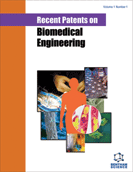Abstract
Blood pressure measurement (BPM) accuracy is greatly important for adequately preventing, diagnosing, and treating many associated cardiovascular diseases. This paper presents a review of the factors determining the BPM accuracy such as the record accuracy, different artifacts, simulators, test devices, algorithmic meanings for blood pressure determination, appropriate choice of cuff and pump, data signal processing as well as novel methods and devices for accurate BPM. We represent here a discussion on BPM accuracy and various patents regarding the same problem and have found multiple patents that propose useful and ingenious decisions concerning different sides of BPM. Most presently proposed patents are worth validating and introducing into the medical practice (when not done at the time of this study). Some patents rely on their own validation studies to prove their applicability for a better BPM accuracy. Finally, completely new methods and devices are cited that allege to be more accurate and are currently in use. An intensive work is in progress with hopes of finding new methods and algorithms to overcome the drawbacks and inaccuracy of the recent BPM methods.
Keywords: Accuracy of blood pressure measurement, blood pressure determination, devices for blood pressure measurement
 17
17

